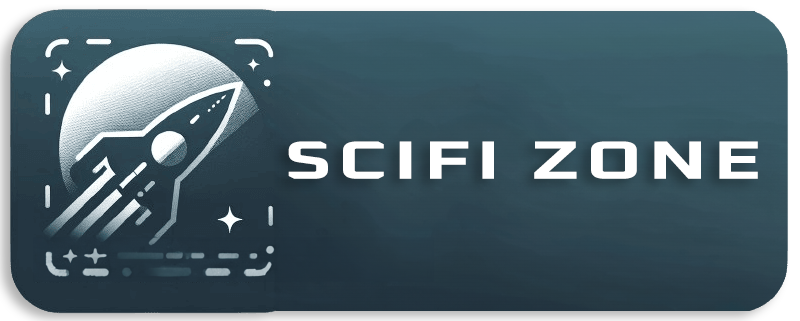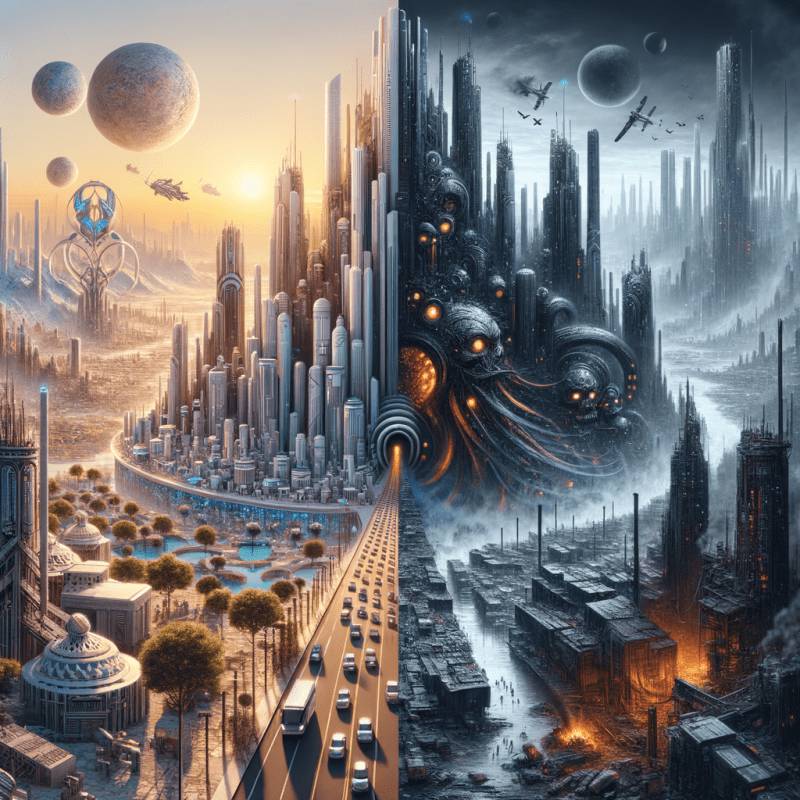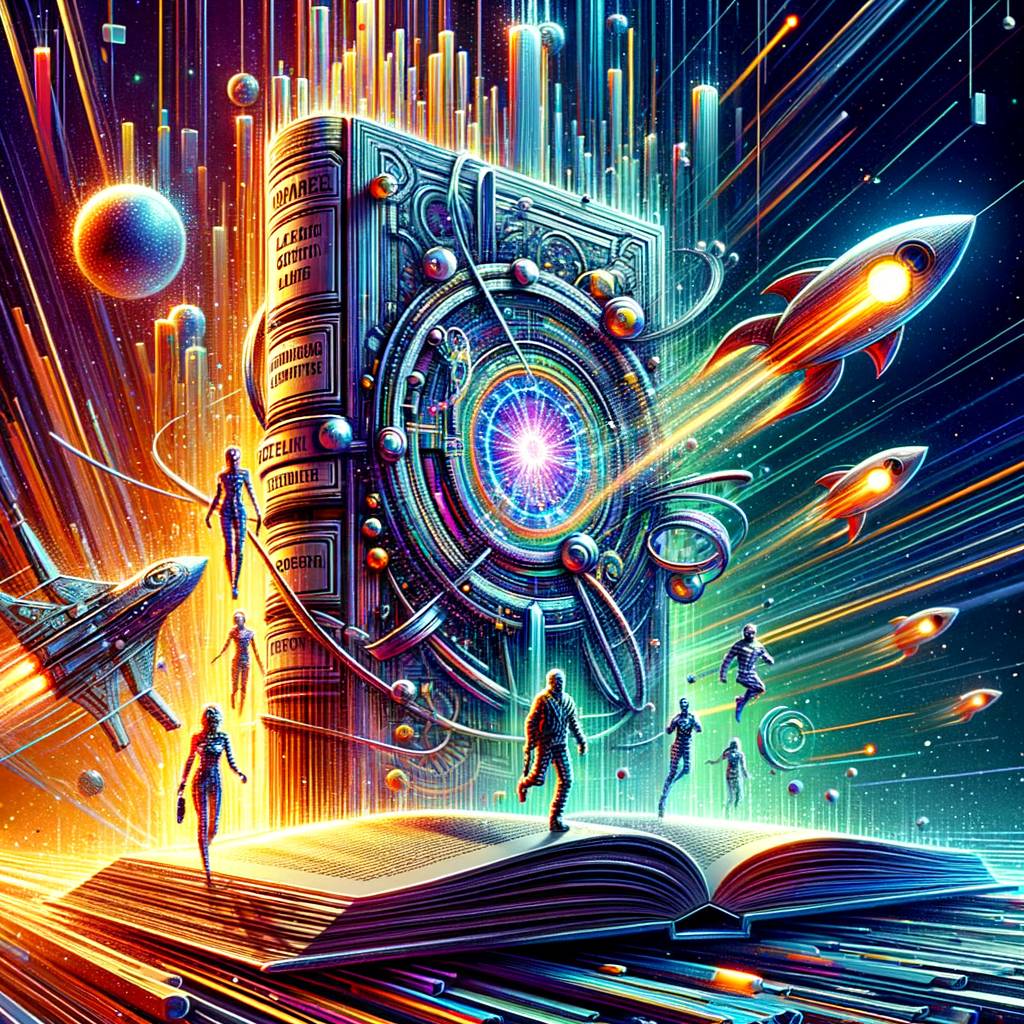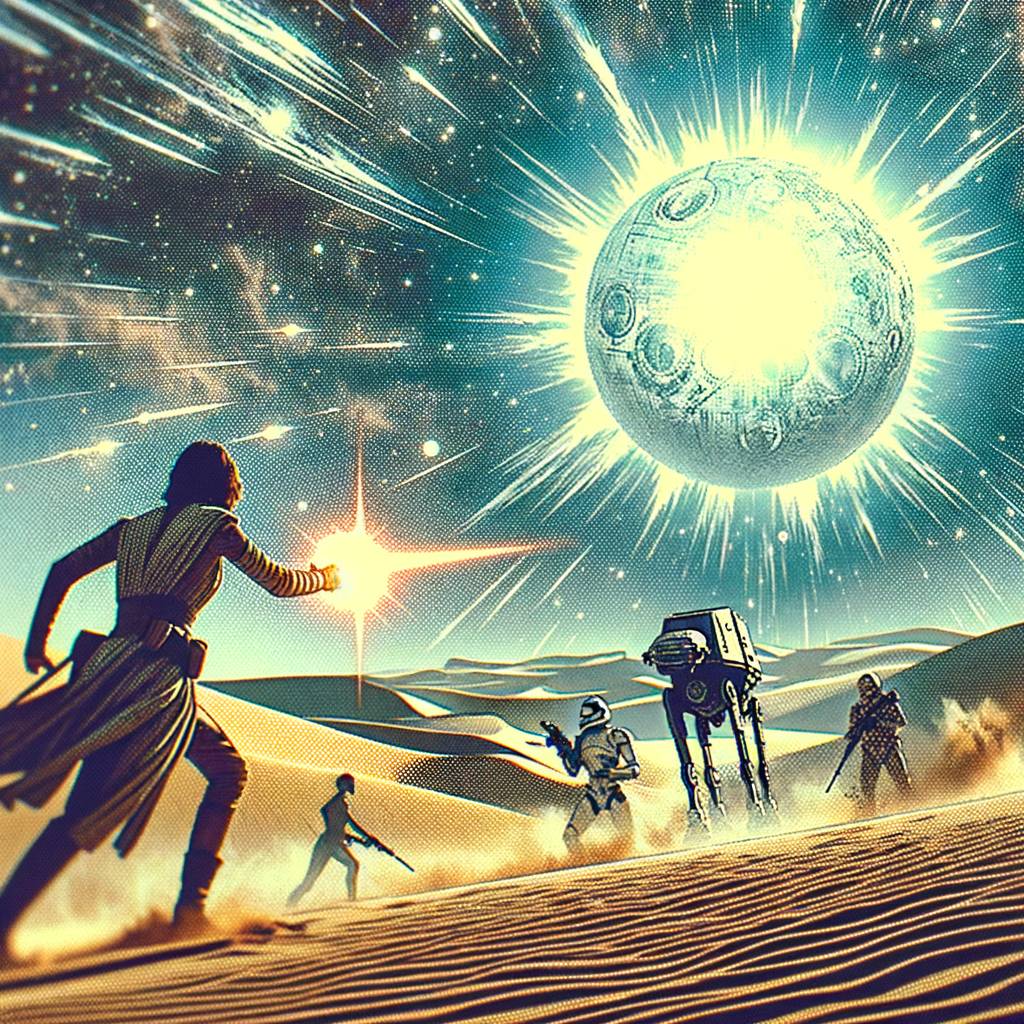Utopia vs Dystopia: Analyzing Societal Constructs in Sci-Fi Literature
In the realm of science fiction, the concepts of utopia and dystopia are often used as a mirror to reflect our own society, magnifying its virtues and vices, hopes and fears. These imagined worlds, whether they are utopian paradises or dystopian nightmares, serve as a canvas upon which authors can paint their visions of the future, allowing us to explore societal constructs in a unique and thought-provoking way.
Utopia, a term coined by Sir Thomas More in 1516, refers to an ideal society where everything is perfect. In utopian sci-fi literature, authors create societies that are free from the problems that plague our own world, such as poverty, inequality, and war. These societies often feature advanced technology, enlightened governance, and a high standard of living for all citizens. They are places of harmony and prosperity, where humanity has overcome its baser instincts and achieved a state of near-perfection.
However, utopias are not always as they seem. Often, beneath the surface of these seemingly perfect societies, there lurks a darker reality. This is where the concept of dystopia comes into play. A dystopia is a society characterized by suffering, oppression, and injustice. In dystopian sci-fi literature, authors depict futures where things have gone horribly wrong. These societies are often marked by totalitarian regimes, rampant inequality, and widespread suffering. They serve as a stark warning of what could happen if we allow our worst impulses to go unchecked.
The beauty of sci-fi literature lies in its ability to use these contrasting societal constructs to explore complex themes and ideas. For instance, in Aldous Huxley’s “Brave New World”, the society appears utopian on the surface, with its citizens living in a state of perpetual happiness and contentment. However, as the story unfolds, we see that this happiness comes at a great cost. The citizens are controlled and manipulated, their lives devoid of any real meaning or purpose. This forces us to question the nature of happiness and the price we are willing to pay for it.
Similarly, in George Orwell’s “1984”, we are presented with a dystopian society where the government exercises total control over its citizens, monitoring their every move and even their thoughts. This chilling vision of the future serves as a powerful critique of totalitarian regimes and the erosion of individual freedoms.
In both these examples, the authors use the constructs of utopia and dystopia to delve into the complexities of societal issues, challenging us to think critically about our own world. They force us to confront uncomfortable truths and ask difficult questions. What does it mean to be free? What is the value of individuality? How much control should a government have over its citizens?
In conclusion, the exploration of utopian and dystopian societies in sci-fi literature offers a fascinating lens through which we can examine our own society. These imagined worlds, whether they are paradises of harmony and prosperity or nightmares of oppression and suffering, serve as a powerful tool for social commentary, allowing us to reflect on our own societal constructs and consider the path we are taking towards the future. Whether we find ourselves in a utopia or a dystopia, the choice, ultimately, is ours.
Exploring the Dichotomy of Utopia and Dystopia in Science Fiction
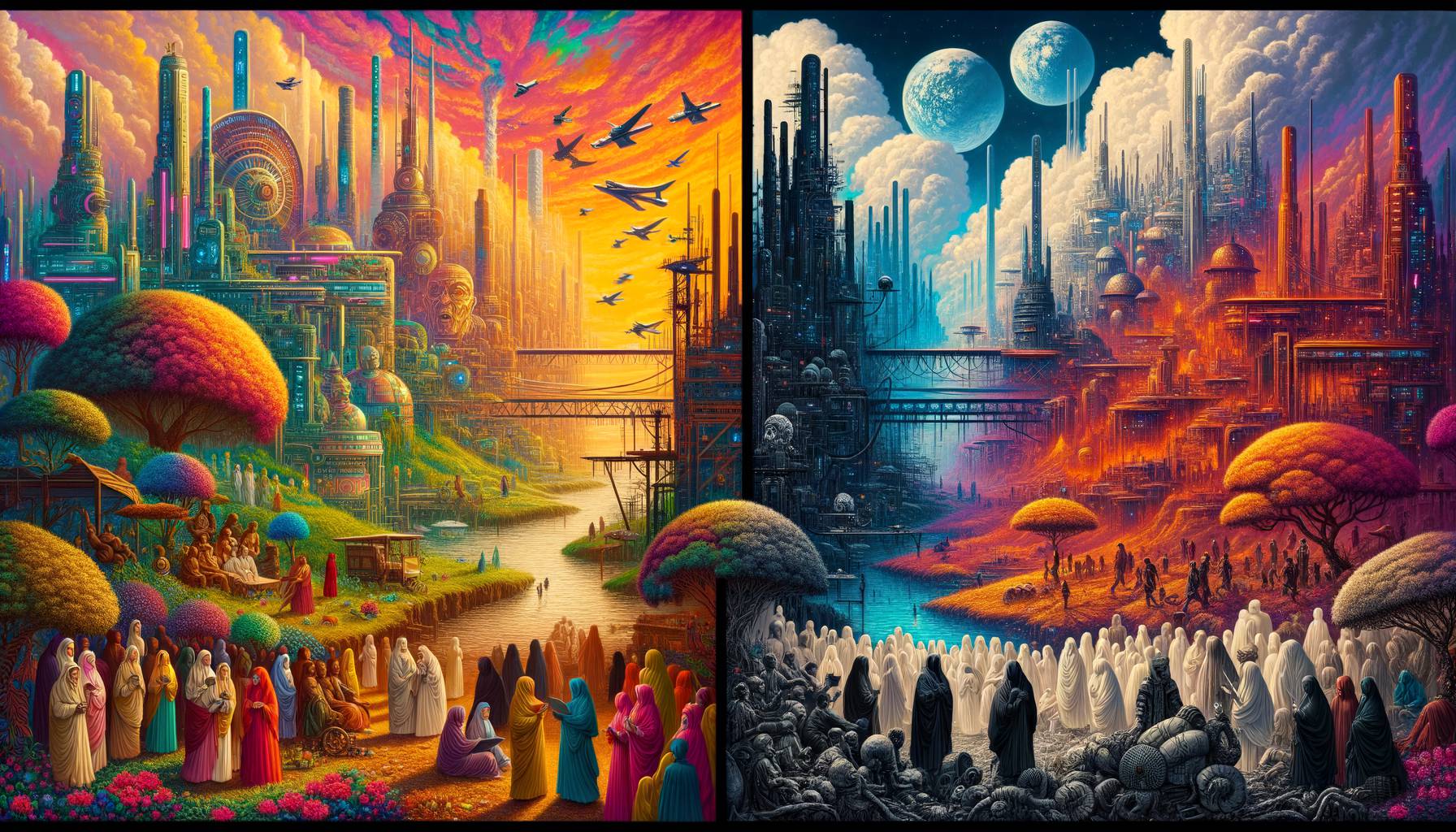
In the realm of science fiction, the concepts of utopia and dystopia are often explored with a sense of curiosity and wonder. These two opposing themes, one representing an ideal society and the other a nightmarish one, serve as a mirror reflecting our deepest hopes and fears about the future. The dichotomy of utopia and dystopia in science fiction is a fascinating study, revealing much about our collective psyche and societal aspirations.
The utopian theme in science fiction paints a picture of a perfect society, a world where all problems have been solved, and harmony reigns. This is a world where technology has been harnessed for the greater good, where social, political, and economic inequalities have been eradicated, and where peace and prosperity are the norm. Utopian science fiction allows us to dream, to imagine a world that is better than our own, and to aspire towards it. It is a beacon of hope, a vision of what could be if we strive to improve and evolve.
However, the utopian vision is not without its critics. Some argue that it is unrealistic, that it ignores the inherent flaws and complexities of human nature. They point out that a perfect society, by definition, leaves no room for growth or change, and thus becomes stagnant and lifeless. This critique leads us to the other side of the coin – dystopia.
Dystopian science fiction presents a stark contrast to the utopian ideal. It depicts a future where things have gone horribly wrong, where society is oppressive, unjust, and often on the brink of collapse. In dystopian narratives, technology is often portrayed as a tool of control and oppression, rather than a force for good. These stories serve as a warning, a grim reminder of what could happen if we let our worst impulses take over.
Yet, despite their bleakness, dystopian stories also carry a message of resilience and hope. They show us characters who refuse to give in, who fight against the odds to reclaim their freedom and humanity. In this sense, dystopian science fiction is not just a cautionary tale, but also a testament to the indomitable human spirit.
The dichotomy of utopia and dystopia in science fiction is not just a matter of contrasting visions of the future. It is also a reflection of our ongoing struggle to define and shape our society. Each theme serves as a lens through which we can examine our current reality, highlighting both our achievements and our shortcomings.
In the end, whether we lean towards utopia or dystopia may depend on our perspective. Are we optimists, believing in our ability to create a better world, or are we pessimists, fearing that we are doomed to repeat our mistakes? The beauty of science fiction is that it allows us to explore both possibilities, to dream and to caution, to hope and to fear. It is a genre that challenges us to think, to question, and ultimately, to choose the kind of future we want to create.
In the dance between utopia and dystopia, science fiction invites us to ponder, to dream, and to fear. It is a genre that challenges us to think, to question, and ultimately, to choose the kind of future we want to create. Whether we lean towards utopia or dystopia may depend on our perspective, but the exploration of these themes in science fiction continues to captivate us, offering a fascinating glimpse into the potential paths of our societal evolution.
The Role of Utopian and Dystopian Themes in Shaping Sci-Fi Narratives
In the realm of science fiction, the concepts of utopia and dystopia are not just mere backdrops, but rather, they are integral elements that shape narratives, provoke thought, and challenge societal norms. These themes, often polar opposites, serve as a mirror to our society, reflecting our hopes, fears, and the potential consequences of our actions.
Utopia, a term coined by Sir Thomas More in 1516, refers to an ideal society where everything is perfect. In the context of science fiction, utopian themes often depict advanced societies where technology has solved all of humanity’s problems. These narratives are often characterized by peace, prosperity, and technological advancement, painting a picture of a future where humanity has reached its zenith.
However, utopian narratives are not just about showcasing a perfect society. They also serve as a critique of our current society, highlighting the flaws and injustices that we need to overcome to reach this ideal state. They challenge us to question our societal norms and values, pushing us to strive for a better future.
On the other hand, dystopian themes present a stark contrast to the utopian ideal. They depict a future where society has taken a turn for the worse, often due to the misuse of technology or the abuse of power. These narratives are characterized by oppression, inequality, and societal decay, painting a grim picture of a future where humanity has lost its way.
Dystopian narratives serve as a warning, showing us the potential consequences of our actions if we continue down a certain path. They force us to confront our fears and anxieties about the future, challenging us to change our ways before it’s too late.
However, the line between utopia and dystopia is often blurred in science fiction. What may seem like a utopia to some may be a dystopia to others, depending on their perspective. This ambiguity adds a layer of complexity to these narratives, forcing us to question our own definitions of utopia and dystopia.
For instance, a society where technology has eliminated all forms of labor may seem like a utopia to some. However, others may view this as a dystopia, arguing that work gives our lives purpose and meaning. Similarly, a society where everyone is equal may seem like a utopia to some. However, others may view this as a dystopia, arguing that it stifles individuality and creativity.
This exploration of utopian and dystopian themes is what makes science fiction such a powerful genre. It allows us to explore different societal models, challenging us to question our values and beliefs. It forces us to confront the potential consequences of our actions, pushing us to strive for a better future.
In conclusion, the concepts of utopia and dystopia are not just mere settings in science fiction. They are powerful tools that shape narratives, provoke thought, and challenge societal norms. Whether it’s a utopia that highlights the flaws in our society or a dystopia that warns us of the potential consequences of our actions, these themes serve as a mirror to our society, reflecting our hopes, fears, and the potential consequences of our actions. So, the next time you delve into a sci-fi narrative, pay close attention to these themes. You might just find a reflection of your own hopes, fears, and potential futures.
